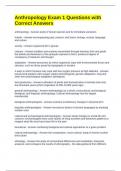Anthropology Exam 1 Questions with
Correct Answers
anthropology - Answer-study of human species and its immediate ancestors
holistic - Answer-encompassing past, present, and future; biology, society, language,
and culture
society - Answer-organized life in groups
cultures - Answer-tradition and customs transmitted through learning; form and guide
the beliefs and behaviors of the poeople exposed to them; produces degree of
consistency in behavior and thought
adaptation - Answer-processes by which organisms cope with environmental forces and
stresses, such as those posed by topography or terrains
4 ways in which humans may cope with low oxygen pressure at high altitudes - Answer-
pressurized airplane with oxygen masks (technological), genetic adaptation, long and
short term physiological adaptation (biological)
food production - Answer-cultivation of plants and domestication of animals took only
few thousand years (which originated 12,000-10,000 years ago)
general anthropology - Answer-anthropology as a whole; sociocultural, archeological,
biological, and linguistic anthropology; Cultural anthropology has the largest
membership
biological anthropologists - Answer-examine evolutionary changes in physical form
linguistic anthropologists - Answer-reconstruct basics of ancient languages by studying
modern ones
cultural and archaeological anthropologists - Answer-study changes in social life and
customs; Archaeologists have used studies of living societies and behaviors patterns to
imagine what life must have been life in the past
biocultural - Answer-combining biological and cultural approaches to a given problem
cultural anthropology - Answer-the comparative, cross-cultural, study of human society
and culture
ehtnology - Answer-the study of sociocultural differences and similarities; interprets,
analyzes, and compares the results of ethnography - the data gathered from different
,societies; uses data to compare and contrast and make generalizations about society
and culture; Gets data from both ethnography and archaeology (reconstructs social
systems of the past)
enthnography - Answer-provides an account of a particular community, society, or
culture; fieldwork in a particular cultural setting
archaeological anthropology - Answer-the study of human behavior through material
remains
potsherds - Answer-fragments of earthenware
ecology - Answer-study of interrelations among living things in an environment
human ecology - Answer-studies ecosystems that include people, focusing on the ways
in which human use of nature influences and is influences by social organization and
cultural values
paleocology - Answer-looks at ecosystems of the past
prehistory - Answer-period before invention of writing
garbology - Answer-William Rathje; provides evidence of what people did, not what they
think they did, what they think they should have done, or what the interviewer thinks
they should have done; has exposed misconceptions about how much different kinds of
trash are in landfills
biological/physical anthropology - Answer-the study of human biological variation in time
and space
5 interests within biological anthropology - Answer-Human evolution as revealed by
fossil record, Human genetics, Human growth and development, Human biological
plasticity, The biology, evolution, behavior, and social life of monkeys, apes, and other
nonhuman primates
paleoanthropology - Answer-Human evolution as revealed by fossil record
biological plasticity - Answer-body's ability to change as it copes with stresses, such as
heat, cold, and altitude
osteology - Answer-study of bones; helps paleontologists who examine skulls, teeth,
bones to identify human ancestors and to chart changes in anatomy over time
primatology - Answer-apes and monkeys (our closest relatives); study biology,
evolution, behavior, and social life, often in their natural environments; assists
paleoanthropology because primate
, linguistic anthropology - Answer-study of language and linguistic diversity in time,
space, and society
historical linguistics - Answer-considers variation in time, such as the changes in
sounds, grammar, and vocabulary between Middle English (A.D. 1050 - 1550) and
modern English
sociolinguistics - Answer-study of language in society
holism - Answer-anthropology's unique blend of biological, social, cultural, linguistic,
historical, and contemporary perspectives
science - Answer-a systematic field of study or body of knowledge that aims, through
experiment, observation, and deduction, to produce reliable explanations of
phenomena, with reference to the material and physical world
humanities - Answer-English, comparative literature, classics, folklore, philosophy, arts;
study languages, texts, philosophies, etc
folklore - Answer-systematic study of tales, myths, and legends from a variety of
cultures
psychological anthropology - Answer-area of cultural anthropology that studies cross-
cultural variation in psychological traits
Bronislaw Malinowski - Answer-famous for field work among Trobriand Islanders of the
South Pacific; reckon kinship matrilineally, consider each other related to mother and
relatives but not father; Relative who disciplines child is the mother's brother; show
marked respect for uncle; relationship is cool and distant; Trobriand father-son
relationship is friendly and affectionate; Father had only sexual role; Authority structure
did more to influence father-son relationship than sexual jealousy
AAA has recognized that anthropology has 2 dimensions - Answer-academic
anthropology, applied/practiced anthropology
applied anthropology - Answer-using anthropology to solve contemporary problems;
application of anthropological data, perspectives, theory, methods to identify, assess,
and solve contemporary social problems; Concerned with relationships between
anthropological knowledge and the uses of that knowledge in the world beyond
anthropology
applied medical anthropologists - Answer-consider both sociocultural and biological
contexts and implications of disease and illness




